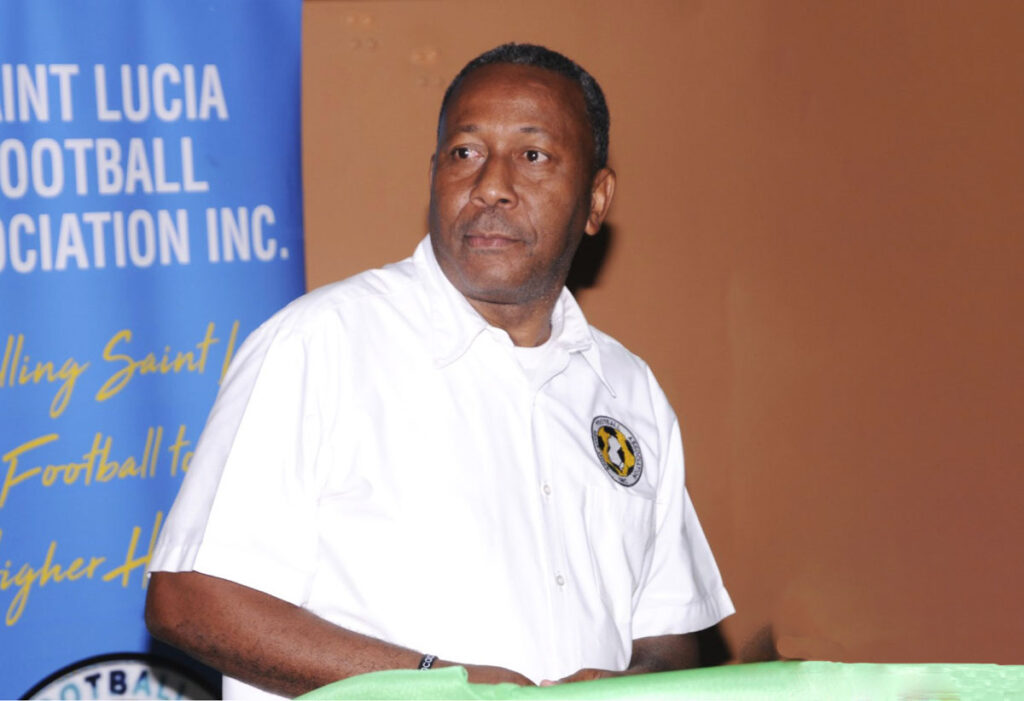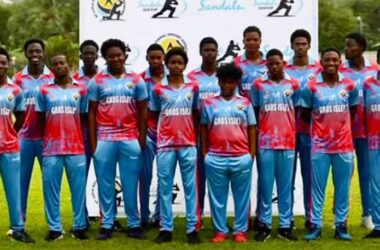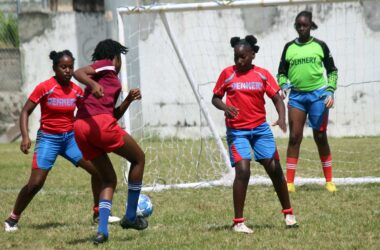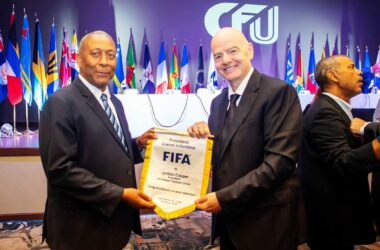
An ongoing dispute over the legality of the Saint Lucia Football Association [SLFA] constitution continues, with stiff opposition from a contender for leadership of the island’s main governing football body.
And despite documentation to verify the validity of the SLFA’s operational structure and management of its affairs – former FIFA referee Sabrina Charles-Kirton is not backing down with her accusations on this issue. In January, after throwing her hat in the ring for leadership contention, she withdrew at the last moment on the day of the elections.
Nonetheless, SLFA President Lyndon Cooper and his crew remain resolute with the quest to chart a way forward for the overall development of football on the island, with the support of the sport’s higher authorities, namely the Fédération Internationale de Football Association [FIFA] which is the international governing body of association football and The Confederation of North, Central America and Caribbean Association Football [CONCACAF] – one of FIFA’s six continental governing bodies.
Speaking on the SLFA’s constitutional regulations and operational procedures, Cooper noted that the SLFA can only be governed by one constitution—the 2012 constitution that was mandated by FIFA and not the 2013 amended version.
“An organization can only have one constitution, and the idea of two constitutions is not only a myth but it is intended to create doubt in the minds of persons who are not associated with the brand of football that we (SLFA) cover,” said Cooper, in an inclusive with VOICE SPORTS, recently.
According to the SLFA’s directive, there is no 2013 constitution and the only constitution that the SLFA is aware of is the 2012 Constitution.
The 2012 Constitution was adopted at the SLFA Congress in 2012, and furthermore, FIFA has mandated that the SLFA be governed by it.
Cooper adds that the controversy over the Constitution is merely a ploy, employed by his detractors intended “to create unnecessary mischief as part of an overall campaign to try to destroy me and the SLFA.”
However, the SLFA president, maintains that the football body is operating through the correct procedures and attempts to sully his name and that of the SLFA’s membership will be dealt with in due time.
He noted: “The constitution contains the legal rules that supersedes all other regulations at the SLFA.”
Commenting on the issue of breaches to the constitution relating to league representation by non-affiliates of the SLFA, Cooper declared that the persons promoting these conflicts and misinformation “do not understand anything about the structure of the SLFA, the governance, nor the rules of engagement and how the SLFA is structured within an international organization.”
He went on to explain that, “There are 19 affiliates but only one affiliate pushing that agenda, silently, behind the curtains. The nomination process is governed by the election procedures and not by the constitution, all that the constitution states is when are elections due and the period of time that persons should hold office.
“It does not tell you how the nomination process is and that’s why we give life to the constitution by creating an election procedure.”
Cooper continued, “Within the structure of football, the only document that a Congress approves, whether it be within FIFA, CONCACAF or any of its members is the constitution. Every other subordinate legislation is approved by the Executive Committee.”
He explained that the ‘Elections Commission’ was formalized to “give life to the constitution” and bring about more creditability to the elections process, which was previously undertaken rather haphazardly. Prior to this, persons showed up on the day of elections and individuals were nominated through a show of hands.
“With the modernization of the governance structure in football, it is a requirement that we regulate that procedure,” he said. “So, we have done that, at least for the past ten years …and no longer are persons coming in on the day to be nominated. There is an elections procedure and there is a process that has to be followed, and that’s approved by the SLFA executive.”
Cooper informed that FIFA utilizes the same process “that was approved by the FIFA Congress …and the only document that FIFA approves is the FIFA statutes, which is called the Constitution. And then FIFA has about 20 regulations and none is approved by the Congress, all is approved by the Executive Committee.”
With plans for the establishment of a semi-professional football league on island, forthcoming, does the SLFA management foresee any possible amendments to the constitution?
The SLFA president replied affirmatively.
“There will be none …as the Constitution governs ‘off the field issues’, not the on-field issues. Off the field relates to the governance structure, memberships and that sort of thing. The semi-professional league is going to be covered by …playing conditions or rules and regulations…to govern the conduct and the procedure of playing the competition.”
He asserted: “So far, we do not see any constitutional change, which will affect the Constitution with plans to execute or unfold the semi-pro league.”
Speaking about the SLFA’s organization of football at the district level and why clubs are not affiliates of the association, Cooper explained that, district football began sometime from 1979/80 under guidance of the National Football Union (NFU) with youth and sports councils in existence.
“We have moved from Youth and Sports Councils to leagues,” he explained. “This format was chosen …to ensure that every part of the island was represented at the national level”.
Furthermore, the SLFA president added that since clubs are affiliated to the leagues, they therefore cannot be directly affiliated to the SLFA. Secondly, if clubs were to become the affiliates then the leagues would voluntarily give up their membership to the association.
Responding to queries concerning the dispatch of a letter to FIFA by a group of club representatives, Cooper said, it was revealed that about 50% of the signatories “did not know what they were signing, and they were told it was intended to address some sort of constitutional issue. Whoever brought the letter for the club representatives to sign did not explain to them, and they did not see the contents of the letter. So the letter was separate from (the document signed) by the signatories”.
“And when we did an evaluation of the signatories and the clubs, it was found that more than 50% of them had not met the club licensing requirements for at least the last two years or for the year in review,” he added. “So, if they are so aggrieved by a constitutional issue that does not affect them, because they are not members of the SLFA, one can safely conclude that all of that fracas was motivated by ‘hate and evil’.”
Cooper recalled that interestingly, the letter was addressed to the SLFA’s president and not to the general secretary, which in itself constitutes a breach of the constitution. Thereafter, he noted, the letter was forwarded to the SLFA’s legal representatives “for them to advise us, on how to respond (to this issue) … and I can assure you that, all those clubs that supported the petition written with their signatories will have to account for their status in the FIFA system when the time comes.”











![Julien Alfred, left, edges Jacious Spears to win the women’s 60 metres at the Tyson Invitational in Arkansas, USA on Friday [Photo credit: CMC]](https://thevoiceslu.com/wp-content/uploads/2026/02/Julien-alfred-1-380x250.jpg)
![Denver Alphonse Jr. [Photo Credit: ASC KCS]](https://thevoiceslu.com/wp-content/uploads/2026/02/Denver-Alphonse-Jr-feat-380x250.jpg)
![On field action in the Bay Bay Cup [Photo credit : MYDS]](https://thevoiceslu.com/wp-content/uploads/2026/02/On-field-action-in-the-Bay-Bay-Cup-feat-380x250.jpg)